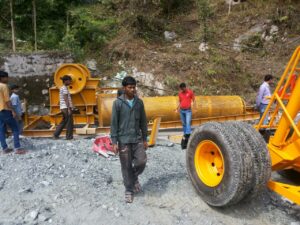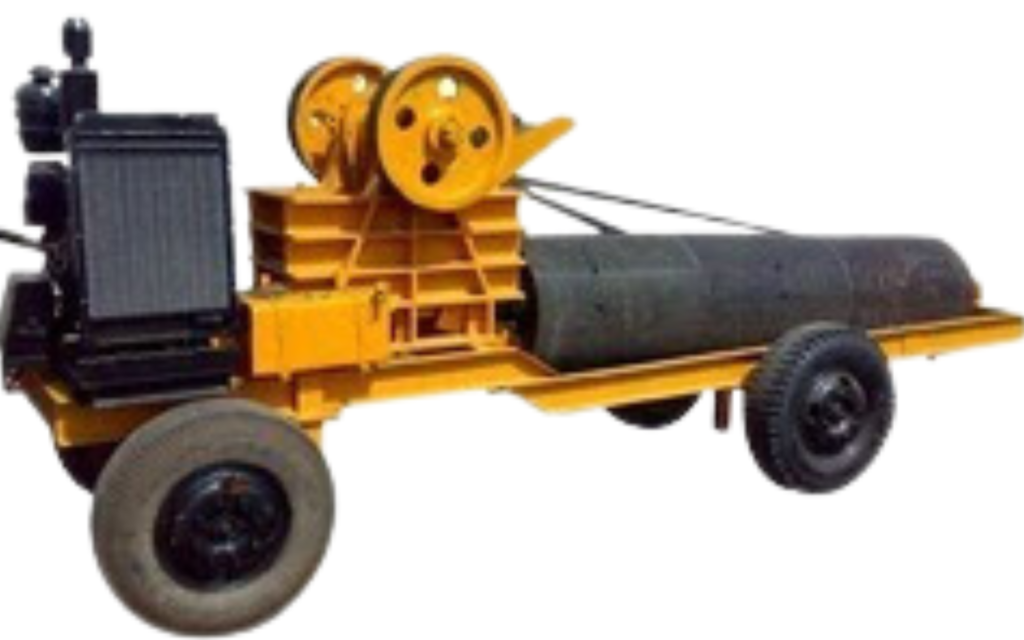
This is a simple headline
Lorem ipsum dolor sit amet, consectetuer adipiscing elit, sed diam nonummy nibh euismod tincidunt ut laoreet dolore magna aliquam erat volutpat.
What is a Portable Crushing Plant?
A portable crushing plant is a type of mobile crushing plant that is designed and built to be transported from one location to another, making it particularly suitable for crushing operations in various construction and mining sites. This type of plant allows the processing of materials on-site, reducing the need for transportation of raw materials and the associated costs. Place an order!
Specifications include:
- 2-stage and 3-stage
- Capacity : 20 TPH to 200 TPH
- Feed size : 300 mm and below
- Output size : 40 mm and below
- Price : INR 1.0 – 3.5 crore
- Power Source : Electricity or diesel generators
- Flexibility : Customized based on specific requirements
Portable Plants Assembly Process
Portable crushing plants offer flexibility and efficiency in various applications, allowing operators to move the equipment as needed to different job sites. The assembly process is designed to be systematic and efficient to minimize downtime and ensure a smooth transition from one location to another. The assembly process of a portable crushing plant typically involves the following steps:
- Design and Planning: Engineers and designers plan the layout and configuration of the portable crushing plant based on the specific requirements of the project and the type of materials to be processed.
- Fabrication of Components: Various components of the crushing plant, such as crushers, screens, conveyors, and control panels, are fabricated in a manufacturing facility. These components are designed to be easily assembled and disassembled for transportation.
- Assembly of Components: The fabricated components are transported to the assembly site. At the site, skilled workers or technicians assemble the components according to the design specifications. This includes the installation of crushers, screens, conveyor belts, and other necessary equipment.
- Electrical Wiring and Control Systems: Electrical wiring and control systems are installed to ensure the proper functioning of the crushing plant. This includes wiring for motors, sensors, and control panels. The control systems are crucial for monitoring and managing the crushing process efficiently.
- Testing and Quality Control: Before the portable crushing plant is put into operation, thorough testing and quality control checks are conducted. This ensures that all components are functioning correctly and that safety standards are met.
- Transportation and Setup: Once the assembly and testing are complete, the portable crushing plant is disassembled for transportation. The components are loaded onto trucks or trailers and transported to the desired location.
- Installation on Site: At the destination site, the portable crushing plant is set up by reassembling the components. This process may include securing the equipment, connecting electrical systems, and making any necessary adjustments to ensure proper operation.
- Commissioning: The final step involves commissioning the crushing plant. This includes starting up the equipment, checking for any issues, and fine-tuning the system for optimal performance.
Types of Portable Plants:
- Jaw Crushers: Suitable for primary crushing; widely used in quarrying and mining.
- Cone Crushers: Ideal for secondary and tertiary crushing; good for producing fine aggregates.
- Impact Crushers: Used for shaping and producing smaller-sized coarse and fine aggregates.
- Screening Plants: Include screens to separate different sizes of material.
Checklist for Choosing the Portable Plant:
- Application Requirements: Ensure the plant meets the specific needs of your project (e.g., type of material, production capacity).
- Mobility and Transportability: Assess how easily the plant can be transported and set up at different job sites.
- Crusher Type: Choose the right type of crusher based on the material characteristics and final product requirements.
- Capacity and Output Size: Check if the plant can handle the required production capacity and produce the desired output size.
- Power Source: Evaluate the power source (e.g., diesel, electric) based on availability and operational preferences.
- Ease of Maintenance: Consider the maintenance requirements and accessibility of key components.
- Environmental Compliance: Ensure the plant complies with environmental regulations and has appropriate emission controls.
- Safety Features: Verify that the plant incorporates necessary safety features to protect operators and maintenance personnel.
- Manufacturer Reputation: Choose a reputable manufacturer with a history of producing reliable and durable equipment.
- Cost: Consider the initial purchase cost as well as operating and maintenance costs.
- Warranty and Support: Check the warranty offered by the manufacturer and the availability of technical support.
- Reviews and References: Look for customer reviews and seek references from other users to gauge the plant’s performance and reliability.
Why Choose HPPA Portable Crushing Plants?
Reliability and Durability:
Problem: Many users face issues with the reliability and durability of portable crushers, leading to frequent breakdowns and maintenance.
Solution: HPPA Crushers are engineered for robustness and longevity, ensuring reliable performance even in challenging environments. The use of high-quality materials and advanced manufacturing processes enhances the durability of these crushers, reducing the likelihood of unexpected failures.
Versatility and Adaptability:
Problem: Some portable crushers may lack versatility, limiting their ability to handle various materials and applications effectively.
Solution: HPPA Crushers are designed with versatility in mind, capable of efficiently processing a wide range of materials. Their adaptability makes them suitable for diverse applications, providing users with a comprehensive solution for different crushing needs.
Ease of Maintenance and Serviceability:
Problem: Users often encounter challenges related to the maintenance and serviceability of portable crushers, leading to increased downtime and higher operational costs.
Solution: HPPA Crushers are engineered with user-friendly maintenance features, allowing for easier access to critical components. This design facilitates routine maintenance tasks, reduces downtime, and ensures that servicing can be performed efficiently, contributing to lower overall operational costs.
Fuel Efficiency and Environmental Impact:
Problem: Some portable crushers may be inefficient in terms of fuel consumption, contributing to higher operational expenses and a larger environmental footprint.
Solution: HPPA Crushers are designed with a focus on fuel efficiency, utilizing advanced technologies to optimize energy consumption. By choosing HPPA Crushers, users can benefit from reduced fuel costs and contribute to environmentally friendly crushing operations.
Advanced Technology and Automation:
Problem: Outdated technology and a lack of automation can hinder the performance and efficiency of portable crushers.
Solution: HPPA Crushers incorporate advanced technologies and automation features, enhancing overall efficiency and ease of operation. This includes intelligent control systems that optimize the crushing process, improving output while minimizing manual intervention.

